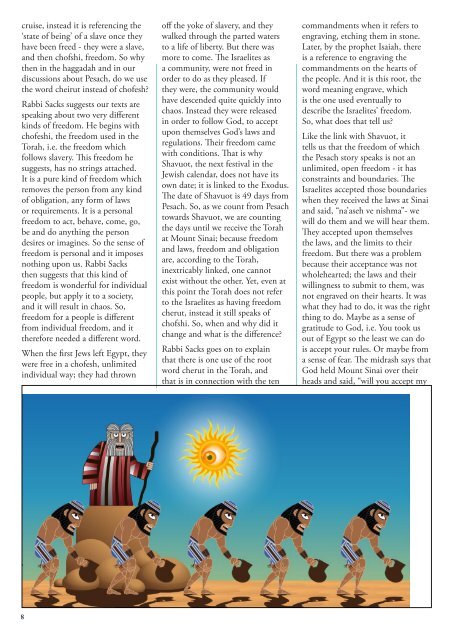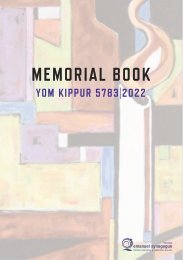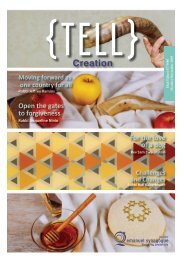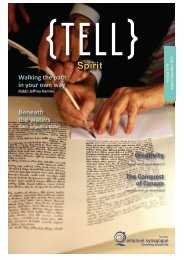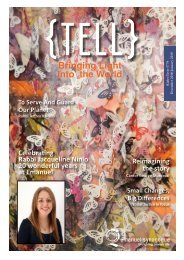Create successful ePaper yourself
Turn your PDF publications into a flip-book with our unique Google optimized e-Paper software.
cruise, instead it is referencing the<br />
‘state of being’ of a slave once they<br />
have been freed - they were a slave,<br />
and then chofshi, freedom. So why<br />
then in the haggadah and in our<br />
discussions about Pesach, do we use<br />
the word cheirut instead of chofesh?<br />
Rabbi Sacks suggests our texts are<br />
speaking about two very different<br />
kinds of freedom. He begins with<br />
chofeshi, the freedom used in the<br />
Torah, i.e. the freedom which<br />
follows slavery. This freedom he<br />
suggests, has no strings attached.<br />
It is a pure kind of freedom which<br />
removes the person from any kind<br />
of obligation, any form of laws<br />
or requirements. It is a personal<br />
freedom to act, behave, come, go,<br />
be and do anything the person<br />
desires or imagines. So the sense of<br />
freedom is personal and it imposes<br />
nothing upon us. Rabbi Sacks<br />
then suggests that this kind of<br />
freedom is wonderful for individual<br />
people, but apply it to a society,<br />
and it will result in chaos. So,<br />
freedom for a people is different<br />
from individual freedom, and it<br />
therefore needed a different word.<br />
When the first Jews left Egypt, they<br />
were free in a chofesh, unlimited<br />
individual way; they had thrown<br />
off the yoke of slavery, and they<br />
walked through the parted waters<br />
to a life of liberty. But there was<br />
more to come. The Israelites as<br />
a community, were not freed in<br />
order to do as they pleased. If<br />
they were, the community would<br />
have descended quite quickly into<br />
chaos. Instead they were released<br />
in order to follow God, to accept<br />
upon themselves God’s laws and<br />
regulations. Their freedom came<br />
with conditions. That is why<br />
Shavuot, the next festival in the<br />
Jewish calendar, does not have its<br />
own date; it is linked to the Exodus.<br />
The date of Shavuot is 49 days from<br />
Pesach. So, as we count from Pesach<br />
towards Shavuot, we are counting<br />
the days until we receive the Torah<br />
at Mount Sinai; because freedom<br />
and laws, freedom and obligation<br />
are, according to the Torah,<br />
inextricably linked, one cannot<br />
exist without the other. Yet, even at<br />
this point the Torah does not refer<br />
to the Israelites as having freedom<br />
cherut, instead it still speaks of<br />
chofshi. So, when and why did it<br />
change and what is the difference?<br />
Rabbi Sacks goes on to explain<br />
that there is one use of the root<br />
word cherut in the Torah, and<br />
that is in connection with the ten<br />
commandments when it refers to<br />
engraving, etching them in stone.<br />
Later, by the prophet Isaiah, there<br />
is a reference to engraving the<br />
commandments on the hearts of<br />
the people. And it is this root, the<br />
word meaning engrave, which<br />
is the one used eventually to<br />
describe the Israelites’ freedom.<br />
So, what does that tell us?<br />
Like the link with Shavuot, it<br />
tells us that the freedom of which<br />
the Pesach story speaks is not an<br />
unlimited, open freedom - it has<br />
constraints and boundaries. The<br />
Israelites accepted those boundaries<br />
when they received the laws at Sinai<br />
and said, “na’aseh ve nishma”- we<br />
will do them and we will hear them.<br />
They accepted upon themselves<br />
the laws, and the limits to their<br />
freedom. But there was a problem<br />
because their acceptance was not<br />
wholehearted; the laws and their<br />
willingness to submit to them, was<br />
not engraved on their hearts. It was<br />
what they had to do, it was the right<br />
thing to do. <strong>May</strong>be as a sense of<br />
gratitude to God, i.e. You took us<br />
out of Egypt so the least we can do<br />
is accept your rules. Or maybe from<br />
a sense of fear. The midrash says that<br />
God held Mount Sinai over their<br />
heads and said, “will you accept my<br />
8


